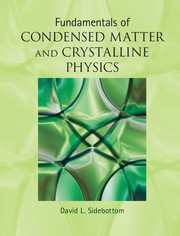 Fundamentals of Condensed Matter and Crystalline Physics
Fundamentals of Condensed Matter and Crystalline Physics from Part II - Scattering
Published online by Cambridge University Press: 05 August 2012
Introduction
In contrast to the sharp, discrete scattering that occurs in crystals as a result of their perfect periodicity, amorphous materials possess a distribution of particle spacings and display scattering that is far more continuous as a function of the scattering wave vector. In this chapter, we explore in detail the relationship between the structure factor of a liquid or glass and the corresponding short-range order described by the pair distribution function introduced in Chapter 2. We demonstrate that S(q) is (mostly) a Fourier transform of the pair distribution function. Thus again, prominent features of the static structure factor point to recurrent particle spacings present in the material, and provide vital experimental clues to the short-range order.
In this chapter, we also look at how visible light is scattered by liquids and glasses. Unlike X-rays that probe mainly the short-range order resident over just a few coordination layers, the larger wavelength of visible light makes it sensitive to larger-scaled density variations caused by thermal fluctuations. In this alternative scattering regime, the pattern of density fluctuations is described by the van Hove correlation function which, again, is related to S(q) by a Fourier transform.
To save this book to your Kindle, first ensure [email protected] is added to your Approved Personal Document E-mail List under your Personal Document Settings on the Manage Your Content and Devices page of your Amazon account. Then enter the ‘name’ part of your Kindle email address below. Find out more about saving to your Kindle.
Note you can select to save to either the @free.kindle.com or @kindle.com variations. ‘@free.kindle.com’ emails are free but can only be saved to your device when it is connected to wi-fi. ‘@kindle.com’ emails can be delivered even when you are not connected to wi-fi, but note that service fees apply.
Find out more about the Kindle Personal Document Service.
To save content items to your account, please confirm that you agree to abide by our usage policies. If this is the first time you use this feature, you will be asked to authorise Cambridge Core to connect with your account. Find out more about saving content to Dropbox.
To save content items to your account, please confirm that you agree to abide by our usage policies. If this is the first time you use this feature, you will be asked to authorise Cambridge Core to connect with your account. Find out more about saving content to Google Drive.